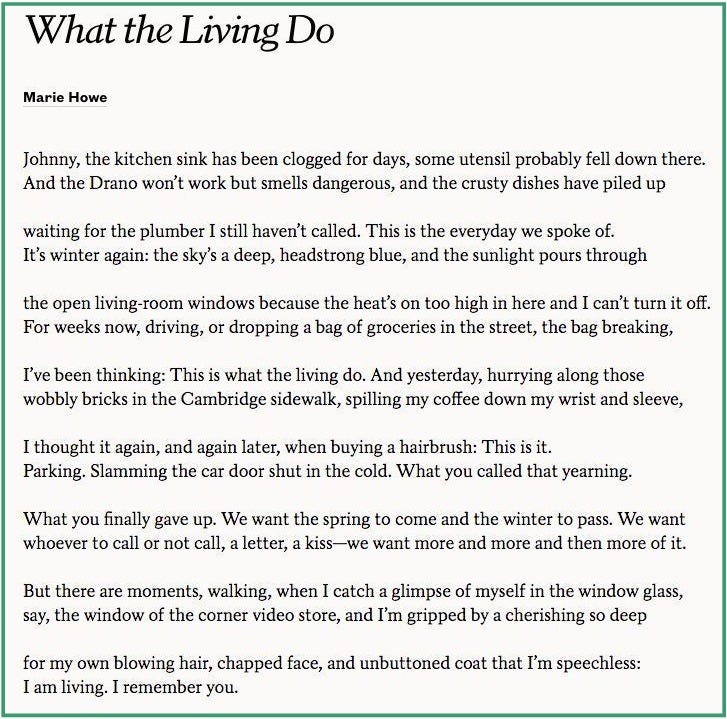remember, we must die
on the rude reckoning with mortality and the micro deaths we breathe & grieve
the fact of impending death never really went anywhere, but there are some moments that make us all reckon with our mortality more than the average day and society collectively is having that moment after the tragic plane crash. i guess that explains why this post is around death (and living), always hand in hand.
1. the obviousness of death with a capital D
you know when you join a formal group or are at a corporate event and they do the classic icebreaker of “tell us one unexpected fact about you”? for as long as i remember, i’ve had one answer. it’s that i enjoy airplane turbulence. and while the surface-level reason behind is that it’s like a free rollercoaster in air, the real answer is that every turbulence makes me reckon with my mortality and then i mentally make a list of all the people who would miss me if i die1. it’s a humbling exercise. and one of gratitude.
this was a lovely piece around why death stirs our soul, why it is the ultimate mockery of our life, and how the fear of it can be crippling. it talks about how stoicism views death (which is resonant in ways of how buddhism also accepts death).
Mortality isn’t just about your own end—it’s about the ones you love, the threads that tie you to the world. The thought of losing them, or of leaving them behind, is a grief that starts before the loss. It’s the empty chair you imagine, the voice you’ll never hear again, the weight of words left unsaid. I’ve stood by bedsides, watching families hold vigil, their hands trembling as they cling to every moment. That fear of severance, of love cut short, is what makes death so heavy. It’s not just an ending; it’s a tearing apart, a reminder of how fragile our connections are. That vulnerability can make you want to shut down, to guard your heart, but it’s also what makes life so precious.
2. the trouble with being alive
enough has been written about Bourdain, and even more has been written (and speculated) about why people end their lives2. “insight doesn’t bring peace”. this made me pause. all the knowing, and seeing, and experiencing, and uncovering - and sometimes all it does is sharpen the edges of life.
How can a man, with such a fruitful outlook on life, people, travel and the overall sense of life purpose still not have a reason to stay?
But here’s the thing that haunts me:
He saw everything. And still, it wasn’t enough
3. some things were always meant to die
not everyone (fortunately?) has seen Death up close. this one’s about the micro deaths many more of us experience. some relationships were always meant to have a short life but to nonetheless lean in and live them in full is a gift of life. all these micro deaths of ‘what-we-had’s and ‘what-we-were’s, and each leaving crumbs around your life. that one recipe you learnt from him three summers ago that you still enjoy cooking on lazy sundays. that new artist she introduced you to that always makes you think back to that rainy long drive. or that particular catch phrase he used to say all the time that has now entered your lexicon permanently. micro deaths, but somehow living on, in you, with you.
i thoroughly enjoyed reading this essay, with a wide grin throughout and a chuckle and snigger every now and then.
Flings sting. They leave pain, and yes, it’s often unfair. There's no escaping that truth; the sweet, fleeting nature of them means they always end too soon, leaving you with a longing that lingers far longer than you expect. But that’s part of their beauty. The impermanence of a fling makes it so alive, so vibrant in the moment. And even though it hurts, it’s the kind of pain that feels like it’s worth it. Because in that moment, you were fully there… no distractions, no hesitations, just the pure bliss of being with someone who, even for a short while, becomes everything to you.
4. poetry interlude ~ this is what the living do
we want more and more and more of it. all the moments. the little ones. the ones we procrastinate. the ones we don’t want but like the option of wanting.
this poem captures the giref of losing a loved one. and the frustration of carrying on? with gratitude for the connection through the mundane? who knows what the poet meant, but i like what it evokes in me.
5. remember, you must die
talking about death is not an invitation to death. there is so much more preparedness - logistical, practical, and emotional - we could unlock in our families and communities if we spoke more openly about death3.
because it will come unexpectedly sometimes. like it did for more than 200 individuals on that plane. and the many other deaths caused by the ripple effects of theirs - deaths of families, dreams, hopes, and livelihoods.
This is rooted in the science known as “temporal scarcity.” It’s the idea that when an asset is temporary or rare — whether it’s a diamond, a pumpkin-spiced latte, or anything “available for a limited time only” — our perception of its value spikes. It’s the same for life. When we’re reminded that our time is scarce, we take it seriously.
CLICK HERE: Why Thinking About Death Enriches Your Lifesorry i know this is not my best at all but cmon, haha?
until next time & new reads!
🌻
~ rufus
sometimes i will realise that a particular person is perhaps no longer on that list and it would obviously make me cry but hey who doesn’t cry on flights!?
i had first typed ‘people choose to end their lives’ but changed that to simply say ‘people end their lives’. i’m not convinced there is always a choice.
one of my favorite books around this is Being Mortal by Atul Gawande, that challenges modern medical care, and how it should be more focused on end-of-life and hospice care









